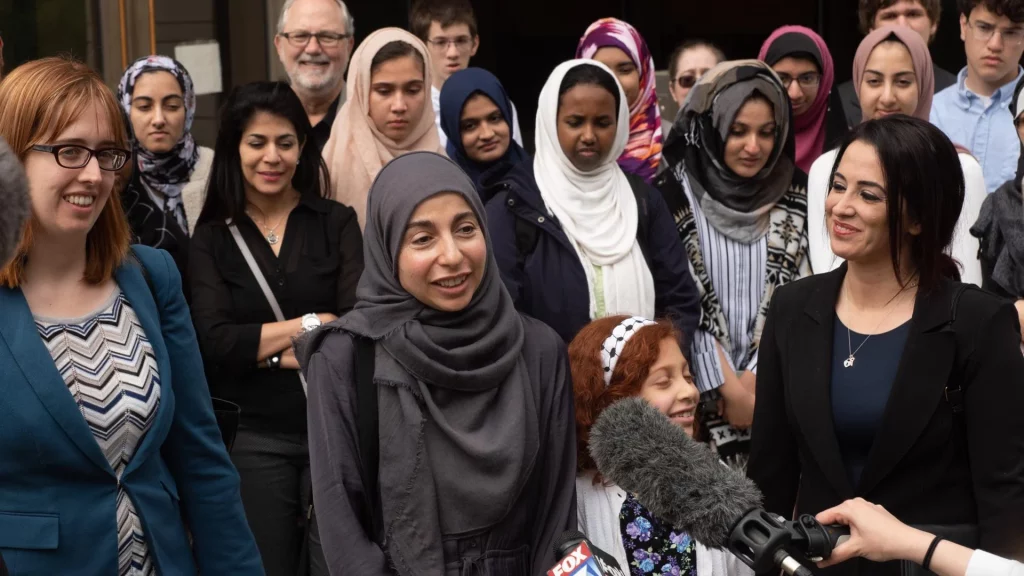 Available online through the Boston Palestine Film Festival, Brazilian documentary filmmaker Julia Bacha’s newest educational piece Boycott probes and de-legitimizes the anti-BDS (Boycott, Divestment, and Sanctions against the State of Israel) legal campaign at the state government level in the United States. Worried about the more than 30 states that have introduced anti-boycott legislation designed to penalize individuals who support boycotts against Israel, Boycott is concerned about first-amendment rights more than anything else.
Available online through the Boston Palestine Film Festival, Brazilian documentary filmmaker Julia Bacha’s newest educational piece Boycott probes and de-legitimizes the anti-BDS (Boycott, Divestment, and Sanctions against the State of Israel) legal campaign at the state government level in the United States. Worried about the more than 30 states that have introduced anti-boycott legislation designed to penalize individuals who support boycotts against Israel, Boycott is concerned about first-amendment rights more than anything else.
While Bacha may have a bleeding heart for the Palestinian people, somewhat surprisingly (and just like the laws at the center of the film) the issues of Israel-Palestine can easily be substituted for any other oppositional boycott strategizing political movement—anti-fossil fuel, anti-Planned Parenthood, anti-NRA, etc. The documentary is presented almost entirely in English, with very few Palestinian or Israeli voices, and makes its argument through allusions to the Boston tea boycott and the NRA before finishing with postscripts about Texas’s use of these anti-BDS laws as a template for blocking fossil fuel boycotts. Boycott makes no honest pretenses about its true subject matter: the First Amendment. Or, it’s at least presented that way to earn good faith with a certain segment of voters—libertarians and big-government skeptics—who would never care about Palestine otherwise.
The government restricting who one can and cannot boycott is a blatant violation of the first amendment. From a newspaper editor in Arkansas (with a Trump photo in his office) who has never boycotted Israel and just doesn’t like governmental interference to the pro-Israel rabbi of the largest synagogue in Arkansas, Bacha makes strategic choices of her subjects opposed to these laws. With one exception, they aren’t liberal Ohioans or activist college students. She picks “white collar” workers from the American south, likely Trump supporters, and even a Muslim woman (from Texas) who makes a big deal about how her American values are the ones motivating her opposition to the Texas bill.
“How many words would I have to change to use this bill to make it about Black Lives Matter (or the NRA)…it’s like 10 words,” observes one interview subject about a bill in Arkansas or Texas (I forget which, but it doesn’t really matter since they’re all the same).
Rabbi Barry Block, for example, while being personally very pro-Israel and likely a Zionist, is appalled that a newspaper would have to self-limit their freedom of the press. He also notes that these (mostly but not exclusively conservative) state lawmakers never contacted him, arguably the most important Jewish leader in the state, for advice, comment, or support. One infers, especially with the documentary’s last fifteen or so minutes, that this relative absence of American Jewish voices reflects the anti-BDS movement’s white evangelical and nationalistic base support. Televangelist John Hagee even makes an appearance, telling American evangelicals that they have a “stake” in the State of Israel. A GOP state lawmaker chillingly adds, “The state is not protected from the church but the church is protected from the state.”
BPFF’s presentation of Boycott is preceded by an introduction by filmmaker Julia Bacha and a five-minute narrative short titled “Siri Miri” (directed by Luay Awwad) about two young men who ask Siri to help alleviate their boredom.
Boycott
2022
dir. Julia Bacha
70 min.
Boycott is available for online viewing through the Boston Palestine Film Festival until October 23.

